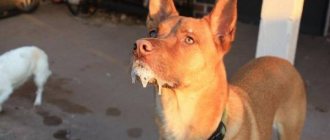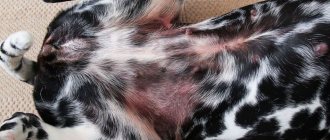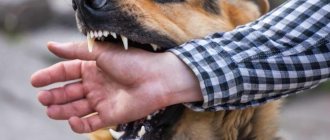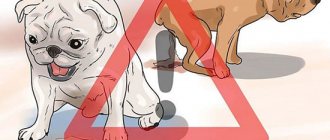How to diagnose pathology?
Rejection of the contents of the stomach and intestines is a natural protective reaction in a living organism in the event of danger or penetration of a foreign object. It is extremely difficult to determine the cause of this condition without the help of a veterinarian, however, sometimes you can understand how serious it is by the consistency and color of the contents.
What does the color of feces indicate?
As a rule, the color of feces depends on what the dog has eaten, that is, on the composition of the food. If, in addition to the changed consistency, the color changes, this may indicate a pathological condition.
- Yellow - may indicate indigestion, food poisoning, the presence of helminths and poor liver function. If a change in the color of stool is accompanied by lethargy, lack of appetite, and an increase in body temperature, then parvovirus enteritis can be assumed.
- Red - the presence of scarlet blood in the stool may indicate injury to the intestines or a violation of the integrity of its mucosa. The reason for this may be a foreign object, severe inflammation or acute infection.
- Green - indicates fermentation processes in the intestines; the presence of mucus and foam may indicate dysbacteriosis or an intestinal infection.
- Black - gastric bleeding, pathological condition of the duodenum.
- White - liver problems, hepatitis, bile duct disorders.
Just like feces, vomit can tell a lot about an animal's condition. Vomiting of bile mixed with foam is observed in cases of liver problems, in the case of diseases of the duodenum and hunger (hunger vomiting).
Causes
The occurrence of pathology occurs for the following reasons:
- Mistakes the owner makes when feeding food:
- The natural response to eating food not intended for dogs is table scraps, chocolate, butter, other delicacies, cat food.
- Unskilled actions when transferring a puppy from mother feeding to solid food.
- Irregularity of feeding. A hungry dog swallows food without chewing.
- Feeding a large amount of difficult-to-digest food - skin, bones, etc.
- Poisoning from soured food.
- Consuming waste from the trash can.
- Drug poisoning. Mistakes when feeding feed additives.
- Symptoms of non-communicable diseases:
- Diabetes.
- Hepatitis.
- Pancreatitis.
- Renal failure.
- Gastritis.
- Enteritis.
- Allergy to food.
- Congenital pathology. Forced cleaning of the digestive canal occurs twice a month.
- Blockage of the alimentary tract with foreign objects.
- As a result of the tumor process.
- Symptoms of contagious diseases:
- Helminthiases.
- Protozoa.
- Viral infections complicated by the addition of secondary microflora.
- Toxic infections.
- Post-vaccination complications. They occur if an animal that is in the incubation period of the disease was vaccinated, deworming was not carried out before immunization, or the vaccine turned out to be of inadequate quality.
Diarrhea due to parvovirus enteritis
recommended articles:
- Ascites or dropsy in a dog
- Kidney failure in dogs
First aid
If your animal has diarrhea and is vomiting, but there is no way to immediately seek help from a doctor, then you can provide first aid to your dog using available means.
If you experience frequent bowel movements and vomiting, the following steps are recommended:
- To relieve pain, you can inject an antispasmodic (no-spa, papaverine). If you don’t have ampoules on hand, the drug can be given in tablet form.
- For persistent diarrhea, you can give a bag of smecta. Smecta is diluted in a small amount of water or puppy milk.
- Any available sorbent (activated carbon, enterosgel) should be given.
- In case of chemical poisoning, it is necessary to provide a supply of fresh air.
- Drink plenty of warm water with rehydron (often, but a little at a time).
- Limit your pet's food intake (24-hour fasting diet).
- It is important to provide peace and care.
After providing first aid, it is important to take the sick animal to a doctor as soon as possible.
Vomiting and diarrhea are common manifestations of the disease in puppies.
In most cases, this may be the cause of food poisoning, but these symptoms should not be overlooked, as they may also be the first indicators of a serious illness. If the puppy’s diarrhea and vomiting were one-time occurrences and soon stopped, then there is no need to worry. Perhaps the reason for this manifestation was a change in diet, and the puppy’s body rejected some of its components in this way.
But, if these symptoms appear within a few days, and the puppy looks lethargic and sad, then you should urgently consult a doctor.
When should you contact a veterinarian?
Quite often, attempts to solve the problem on your own at home without visiting a doctor lead to the development of complications, even death. Therefore, you should not rely on your own knowledge and think that nothing serious will ever happen to your pet.
Contact a specialist immediately in the following cases:
- The appearance of new symptoms (shortness of breath, drooling, convulsions, loss of coordination).
- Blood in vomit and feces (bloody diarrhea).
- No improvement after three days.
- Lack of appetite, lethargy, apathy, fear of light.
- Constantly recurring vomiting and diarrhea.
- Signs of dehydration.
- Deterioration of condition.
The pet's low weight and early age may also be a reason to immediately consult a doctor. For example, a small sneeze will be much more difficult to endure poisoning than a pit bull terrier, since its life resources are much more modest. They become dehydrated faster and die more often.
How to determine the cause of a digestive disorder?
You can determine the cause of digestive disorders that cause diarrhea and vomiting using the following methods:
- Pets quite often take foreign objects into their mouths, which can get stuck in the esophagus or gastrointestinal tract. They can only be identified using x-rays, CT, and MRI.
- Blood is drawn from the animal and a general and biochemical blood test is performed to determine the condition of the internal organs and the presence of an inflammatory process.
- The animal's feces are checked for the presence of helminths and other parasites.
- To understand what kind of infection it is, it is necessary to carry out PCR diagnostics.
If after all of the above methods the diagnosis is not established, then you will have to undergo additional studies:
- Bacterial culture is used to determine the type of harmful bacteria that are actively developing in the animal’s intestines.
- An ultrasound examination of the abdominal cavity will allow doctors to get a more detailed picture of what is happening.
- A toxin test will allow you to determine the substance that provoked toxicological poisoning.
Veterinary treatment
At the first opportunity, contact a veterinary hospital. The veterinarian performs a diagnostic test to confirm or refute the diagnosis. Infection with parvovirus and coronavirus can only be determined by a blood test.
Next, the doctor prescribes a comprehensive treatment, which is carried out in a hospital. It includes:
- Antiviral therapy with antibiotics;
- Restoration of water-salt balance;
- Detox therapy;
- Maintaining the cardiovascular system;
- Restoration of intestinal microflora.
Treatment is prescribed by a veterinarian; self-medication can only worsen the situation.
How to properly feed a dog during poisoning?
Indigestion causes a lot of trouble for both the pet and its owner. Diarrhea and vomiting, as a rule, occur due to the development of bacteria that begin to actively multiply in the intestines. As bacteria multiply, large amounts of toxins are released into the blood, which poison the entire body.
Signs of food poisoning are:
- Temperature increase.
- Lack of appetite.
- Nausea.
- Lethargy.
- Diarrhea.
- Vomit.
If your dog is confirmed to have food poisoning and other pathologies have been ruled out, then first of all you need to put him on a fasting diet for at least 24 hours. On the second day, you can introduce a little rice porridge without salt, boiled in water, into your diet. Next, you can add fermented milk products, but in small quantities. They will help normalize the intestinal microflora.
When your general condition improves, you can introduce the following foods:
- Boiled chicken.
- Boiled egg.
- Steamed fish.
In case of persistent diarrhea, you need to feed your pet boiled rice every day, as well as give rice water. You can replenish the fluid deficiency using a solution of Regidron or Hydrolyte.
You can also give your dog special medicated food, but only as prescribed by a veterinarian.
How to prevent the possibility of diarrhea and vomiting in puppies?
- Get the necessary vaccinations prescribed by your veterinarian in a timely manner;
- Worm your puppy regularly;
- When treating your puppy's fur against fleas, follow the rules for applying the product;
- Make sure your puppy's diet is correct. Nutrition should be balanced. You should not overfeed your puppy or give him cheap, unknown brands of food;
- Remove pills, chemicals and cosmetics from the puppy’s access;
- Try to walk your puppy with a muzzle so that he does not have the opportunity to eat a rotten or poisonous product;
- Introduce various foods to your puppy gradually, in small quantities, so that his body gets used to it and does not reject them;
- Teach your puppy to the command “Fu” and “no” in order to stop him from incomprehensible foods.
By regularly taking care of your pet's health, you can significantly reduce the risk of possible diseases, including the threat of diarrhea and vomiting.
ethnoscience
To help your dog with a mild form of poisoning, you can use proven folk remedies:
- Oak bark has excellent astringent properties. To prepare the decoction, grind the bark and pour in 1 tbsp. spoon with a glass of boiling water. Bring the finished mixture to a boil over low heat and cook for 20 minutes. The decoction is given in 1 tbsp. l. every 2 hours, regardless of food intake.
- A decoction of cinquefoil has a good effect on the digestive tract system. To prepare a healing decoction, pour two glasses of boiling water into 2 tbsp. l. chopped herbs and leave with the lid closed. The animal must be given the decoction once a day, 1 tbsp. l.
How to keep your animal healthy: recommendations and prevention
To ensure that your dog is less sick and does not cause many problems, you must adhere to the following recommendations:
- Carefully monitor your pet's diet. You should not feed your dog food from the owner’s table, as well as low-quality economy and premium food. It is better to give preference to the super-premium line or meat with the addition of vegetables and grains.
- When raising your four-legged friend, pay special attention to the “fu” or “no” command. Their knowledge and precise implementation will save your dog’s life more than once.
- Wear a muzzle while walking; it will help avoid many problems such as swallowing inedible objects and poisoned food.
- Do not leave things unattended, especially in easily accessible places. Also keep a close eye on medications and household chemicals.
- It is necessary to wean the puppy off baby food gradually, introducing adult foods or food into its diet every day.
- When treating your dog for fleas and ticks, observe personal hygiene rules and strictly follow the instructions.
- Get vaccinated and dewormed regularly.
Prevention of eating disorders lies solely in proper nutrition. Your pet's diet should always contain nutrients and vital trace elements. Food should be easily digestible.
Limit your friend from communicating with individuals who can serve as a source of infection with various infectious diseases. These include: stray animals and wild animals.
Do not allow your pet to drink water from muddy puddles, unknown bodies of water, ponds or other natural water sources. It is necessary to constantly wash your dog’s paws after a walk, comb it and take care of its ears and eyes.
Viral enteritis
Viral enteritis is an acute infectious disease caused by parvoviruses and coronaviruses. This dangerous disease first affects the gastrointestinal tract, the small intestine becomes inflamed, complete dehydration occurs, and then leads to death. The only way to help protect your pet from damage by these microbes is timely vaccination.
Enteritis is characterized by a clear sequence of onset of symptoms:
- The first symptom to appear is a complete refusal of food and water for 8 hours.
- The second symptom is incessant vomiting, not related to eating.
- The last thing to appear is diarrhea, which happens with blood and mucus.
The above symptoms are accompanied by the appearance of a pungent odor emanating from the dog, an increase in temperature, and loss of coordination.
The biggest danger of infection with parvovirus and coronavirus is that puppies die on the third day after the infection enters the body.











